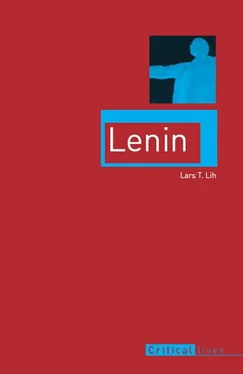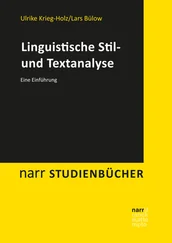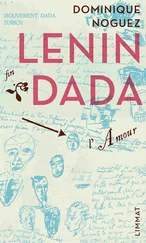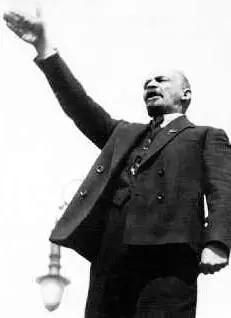
The iconic Lenin in 1919.
We have summoned character witnesses both friendly and hostile to Lenin, but a certain mystery will always remain. An emblem of this mystery is Lenin’s characteristic laugh. Two visiting Englishmen, interviewing Lenin in 1919 and 1920, reacted to this laugh in different ways:
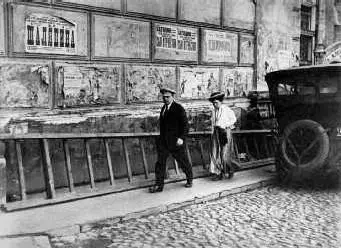
Lenin, accompanied by his sister Maria, hurries along a Moscow street to attend a meeting in 1918; on the wall is a poster for a recital by Feodor Chaliapin.
Arthur Ransome : ‘This little bald-headed, wrinkled man, who tilts his chair this way and that, laughing over one thing or another, ready any minute to give serious advice to any who interrupt him to ask for it, advice so well reasoned that it is to his followers far more compelling than any command, every one of his wrinkles is a wrinkle of laughter, not of worry.’ 19
Bertrand Russell : ‘He is very friendly, and apparently simple, entirely without a trace of hauteur … I have never met a personage so destitute of self-importance…. He laughs a great deal; at first his laugh seems merely friendly and jolly, but gradually I came to feel it rather grim.’ 20
We end by repeating the words of Lenin’s widow, Nadezhda Krupskaya, who provided the Ariadne’s thread that has guided us through the labyrinth of Lenin’s career. She first met Lenin in St Petersburg in 1894. It was here, she tells us, that Lenin fully committed himself to what he saw as ‘Marx’s grand idea’: ‘only as vozhd of all the labourers will the working class achieve victory’. Once Lenin made this commitment, he never wavered: ‘this thought, this idea illuminated all of his later activity, each and every step.’
1 L. Kamenev, ‘The Literary Legacy and Collected Works of Ilyitch’ (written in the early 1920s), text taken from Marxists Internet Archive, www.marxists.org/archive/kamenev/19xx/x01/x01.htm(accessed 5 May 2010).
2 M. G. Shtein, Ulianovy i Leniny: Tainy rodoslovnoi i psevdonima (St Petersburg, 1997).
3 V. I. Lenin, Polnoe sobranie sochinenii , 5th edn (Moscow, 1958–65), vol. 47, p. 120; Lenin, Collected Works (Moscow, 1960–68), vol. 34, p. 372. Except where noted, I will use these two editions for Lenin quotations, so that the reader can consult either the Russian text or English translation. I will use the following style: Lenin, PSS 47:120; CW 34:172. I take responsibility for all translations.
4 An example of this approach is Alfred G. Meyer, Leninism (New York, 1962).
5 The only reliable collection of new Lenin documents is V. I Lenin, Neizvestnye dokumenty 1891–1922 (Moscow, 1999). Among the more important issues illuminated by new documents are Lenin’s relations with Inessa Armand and with Roman Malinovsky, his attitude toward the Polish war as revealed in a speech of September 1920, and the events of his final months. Unfortunately, the English-language edition of the new documents is at a very low professional level; see my review of Richard Pipes, ed., The Unknown Lenin: From the Secret Archive (New Haven, CT, 1996) in Canadian-American Slavic Studies , XXXV/2–3 (Summer/Fall 2001), pp. 301–6 (one of the only reviews of the Pipes edition written after the Russian texts of the new documents had been made available).
6 Michael Pearson, Lenin’s Mistress: The Life of Inessa Armand (London, 2001). Helen Rappaport, author of the recent Conspirator: Lenin in Exile (London, 2009), has commented in an interview: ‘There is, I am sure, a darker, sexual side to Lenin that has been totally suppressed in the Russian record. I do believe that whilst he was in Paris he went to prostitutes – there are clues in French sources about this, but it is very hard to prove.’ See www.bookdepository.com/interview/with/author/helen-rappaport (accessed 5 May 2010).
7 Dmitri Volkogonov, Lenin: A New Biography (New York, 1994); Robert Service, Lenin: A Biography (Cambridge, MA, 2000). The only recent Lenin biography I can recommend with enthusiasm is Christopher Read, Lenin (London, 2005).
8 Lenin, PSS 49:378; CW 35:281.
9 Vospominaniia o Vladimire Iliche Lenine (Moscow, 1969), vol. 1, pp. 574–5.
10 Lenin PSS 6:107; Lars T. Lih, Lenin Rediscovered: What Is to Be Done? in Context (London, 2008), pp. 770–71 (in the case of What Is to Be Done? the references to an English-language source come from the translation of the entire book that is included in my study Lenin Rediscovered ).
11 R. Tucker, Political Culture and Leadership in Soviet Russia: From Lenin to Gorbachev (New York, 1987), p. 39.
1 Albert Rhys Williams, Lenin: The Man and his Work (New York, 1919), pp. 23–4.
2 M. G. Shtein, Ulyanovy i Leniny: Tainy rodoslovnoi i psevdonima (St Petersburg, 1997), pp. 43–7.
3 Katy Turton, Forgotten Lives: The Role of Lenin’s Sisters in the Russian Revolution, 1864–1937 (Basingstoke, 2007), p. 16.
4 Vladlen Loginov, Vladimir Lenin: Vybor puti (Moscow, 2005), p. 38.
5 My account of the ‘second first of March’ is based primarily on Norman Naimark, Terrorists and Social Democrats: The Russian Revolutionary Movement under Alexander III (Cambridge, MA, 1982). Phillip Pomper, Lenin’s Older Brother: The Origins of the October Revolution (New York, 2010) appeared too late for me to use.
6 Narodnicheskaia ekonomicheskaia literatura , ed. V. K. Karataev (Moscow, 1958), p. 634.
7 As cited in Paul Miliukov, Russia and its Crisis (London, 1962), p. 289 (originally published 1905).
8 The quoted words are from Marx’s 1864 Inaugural Address for the International Working Men’s Association.
9 John Rae, Contemporary Socialism (New York, 1884), pp. 127–9.
10 V. I. Lenin, Polnoe sobranie sochinenii , 5th edn (Moscow, 1958–65), vol. 41, p. 8; Lenin, Collected Works (Moscow, 1960–68), vol. 31, p. 25.
11 Loginov, Vladimir Lenin , p. 86.
12 Lenin, PSS 1:310, 330; CW 1:299, 318 ( Friends of the People , 1894).
13 Lenin, PSS 1:333–4; CW 1:321 ( Friends of the People , 1894).
14 Lenin, PSS 3:382; CW 3:382 ( Development of Capitalism in Russia , 1899).
15 Cited by Lenin; see PSS 1:200; CW 1:197 ( Friends of the People , 1894).
16 Cited by Lenin; see PSS 1:277–8, 282–3; CW 1:269, 273–4 ( Friends of the People , 1894).
17 Boris Gorev, Iz partiinogo proshlogo: Vospominaniia, 1895–1905 (Leningrad, 1924), pp. 7–9.
18 Vasily Vodovozov in Na chuzhoi storone (Prague, 1925), vol. 12, p. 177.
19 Lenin, PSS 1:200–202; CW 1:197–8 ( Friends of the People , 1894).
20 Lenin, PSS 4:233; CW 4:248; Georgy Solomon, Sredi krasnykh vozhdei (Moscow, 1995), pp. 450–51. We should also note that the two major Russian Marxists of the time, Georgy Plekhanov and N. E. Fedoseev, both authority figures for the young Ulyanov, also reacted to the famine in complete contrast to the Mikhailovsky caricature.
Читать дальше
